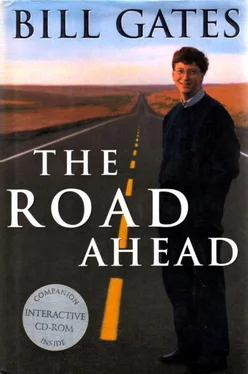The printing press did more than just give the West a faster way to reproduce a book. Until that time, despite the passing generations, life had been communal and nearly unchanging. Most people knew only about what they had seen themselves or been told. Few strayed far from their villages, in part because without reliable maps it was often nearly impossible to find the way home. As James Burke, a favorite author of mine, put it: “In this world all experience was personal: horizons were small, the community was inward-looking. What existed in the outside world was a matter of hearsay.”
The printed word changed all that. It was the first mass medium—the first time that knowledge, opinions, and experiences could be passed on in a portable, durable, and available form. As the written word extended the population’s reach far beyond a village, people began to care about what was happening elsewhere. Printing shops quickly sprang up in commercial cities and became centers of intellectual exchange. Literacy became an important skill that revolutionized education and altered social structures.
Before Gutenberg, there were only about 30,000 books on the entire continent of Europe, nearly all Bibles or biblical commentary. By 1500, there were more than 9 million, on all sorts of topics. Handbills and other printed matter affected politics, religion, science, and literature. For the first time, those outside the canonical elite had access to written information.
The information highway will transform our culture as dramatically as Gutenberg’s press did the Middle Ages.
Personal computers have already altered work habits, but they haven’t really changed our lives much yet. When tomorrow’s powerful information machines are connected on the highway, people, machines, entertainment, and information services will all be accessible. You will be able to stay in touch with anyone, anywhere, who wants to stay in touch with you; to browse through any of thousands of libraries, day or night. Your misplaced or stolen camera will send you a message telling you exactly where it is, even if it’s in a different city. You’ll be able to answer your apartment intercom from your office, or answer any mail from your home. Information that today is difficult to retrieve will be easy to find:
Is your bus running on time?
Are there any accidents right now on the route you usually take to the office?
Does anyone want to trade his or her Thursday theater tickets for your Wednesday tickets?
What is your child’s school-attendance record?
What’s a, good recipe for halibut?
Which store, anywhere, can deliver by tomorrow morning for the lowest price a wristwatch that takes your pulse?
What would someone pay for my old Mustang convertible?
How is the hole in a needle manufactured?
Are your shirts ready yet at the laundry?
What’s the cheapest way to subscribe to The Wall Street Journal ?
What are the symptoms of a heart attack?
Was there any interesting testimony at the county courthouse today?
Do fish see in color?
What does the Champs-Elysées look like right now?
Where were you at 9:02 P.M. last Thursday?
Let’s say you’re thinking about trying a new restaurant and want to see its menu, wine list, and specials of the day. Maybe you’re wondering what your favorite food reviewer said about it. You may also want to know what sanitation score the health department gave the place. If you’re leery of the restaurant’s neighborhood, perhaps you’ll want to see a safety rating based on police reports. Still interested in going? You’ll want reservations, a map, and driving instructions based on current traffic conditions. Take the instructions in printed form or have them read to you—and updated—as you drive.
All of this information will be readily accessible and completely personal, because you’ll be able to explore whatever parts of it interest you in whatever ways and for however long you want. You’ll watch a program when it’s convenient for you, instead of when a broadcaster chooses to air it. You’ll shop, order food, contact fellow hobbyists, or publish information for others to use when and as you want to. Your nightly newscast will start at a time you determine and last exactly as long as you want it to. It will cover subjects selected by you or by a service that knows your interests. You’ll be able to ask for reports from Tokyo or Boston or Seattle, request more detail on a news item, or inquire whether your favorite columnist has commented on an event. And if you prefer, your news will be delivered to you on paper.
Change of this magnitude makes people nervous. Every day, all over the world, people are asking about the implications of the network, often with terrible apprehension. What will happen to our jobs? Will people withdraw from the physical world and live vicariously through their computers? Will the gulf between the haves and have-nots widen irreparably? Will a computer be able to help the disenfranchised in East St. Louis or the starving in Ethiopia? There are some major challenges that will come with the network and the changes it will bring. In chapter 12, I talk at length about the many legitimate concerns I hear expressed again and again.
I’ve thought about the difficulties and find that, on balance, I’m confident and optimistic. Partly this is just the way I am, and partly it’s because I’m enthusiastic about what my generation, which came of age the same time the computer did, will be able to do. We’ll be giving people tools to use to reach out in new ways. I’m someone who believes that because progress will come no matter what, we need to make the best of it. I’m still thrilled by the feeling that I’m squinting into the future and catching that first revealing hint of revolutionary possibilities. I feel incredibly lucky that I am getting the chance to play a part in the beginning of an epochal change for a second time.
I first experienced this particular euphoria as a teenager when I understood how inexpensive and powerful computers would become. The computer we played tic-tac-toe on in 1968 and most computers at that time were mainframes: temperamental monsters that resided in climate-controlled cocoons. After we had used up the money the Mothers’ Club had provided, my school friend Paul Allen, with whom I later started Microsoft, and I spent a lot of time trying to get access to computers. They performed modestly by today’s standards, but seemed awesome to us because they were big and complicated and cost as much as millions of dollars each. They were connected by phone lines to clackety Teletype terminals so they could be shared by people at different locations. We rarely got close to the actual mainframes. Computer time was very expensive. When I was in high school, it cost about $40 an hour to access a time-shared computer using a Teletype—for that $40 an hour you got a slice of the computer’s precious attention. This seems odd today, when some people have more than one PC and think nothing of leaving them idle for most of the day. Actually, it was possible even then to own your own computer. If you could afford $18,000, Digital Equipment Corporation (DEC) made the PDP-8. Although it was called a “mini-computer,” it was large by today’s standards. It occupied a rack about two feet square and six feet high and weighed 250 pounds. We had one at our high school for a while, and I fooled around with it a lot. The PDP-8 was very limited compared to the mainframes we could reach by phone; in fact, it had less raw computing power than some wristwatches do today. But it was programmable the same way the big, expensive ones were: by giving it software instructions. Despite its limitations, the PDP-8 inspired us to indulge in the dream that one day millions of individuals could possess their own computers. With each passing year, I became more certain that computers and computing were destined to be cheap and ubiquitous. I’m sure that one of the reasons I was so determined to help develop the personal computer is that I wanted one for myself.
Читать дальше











